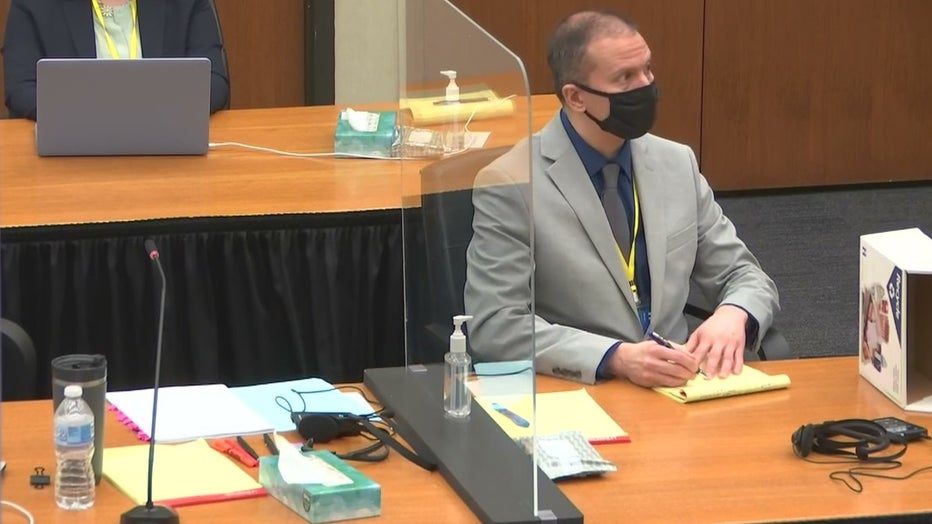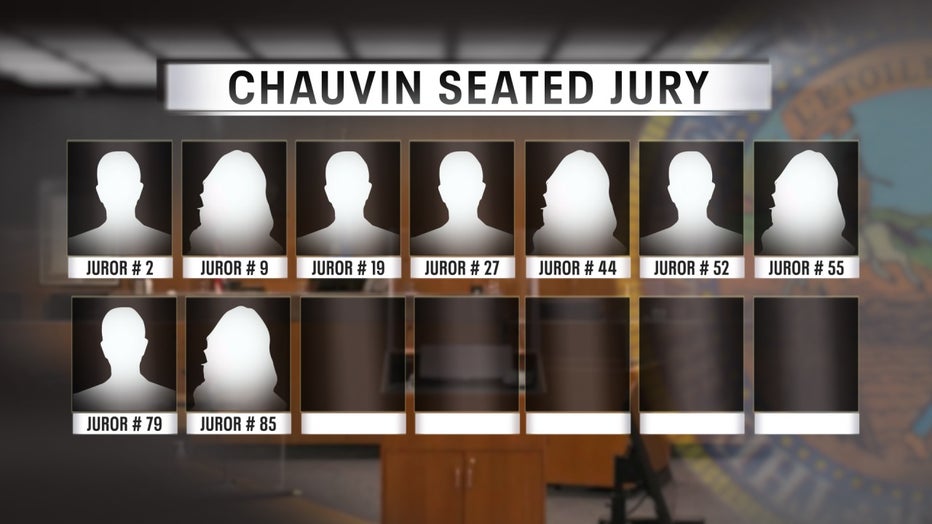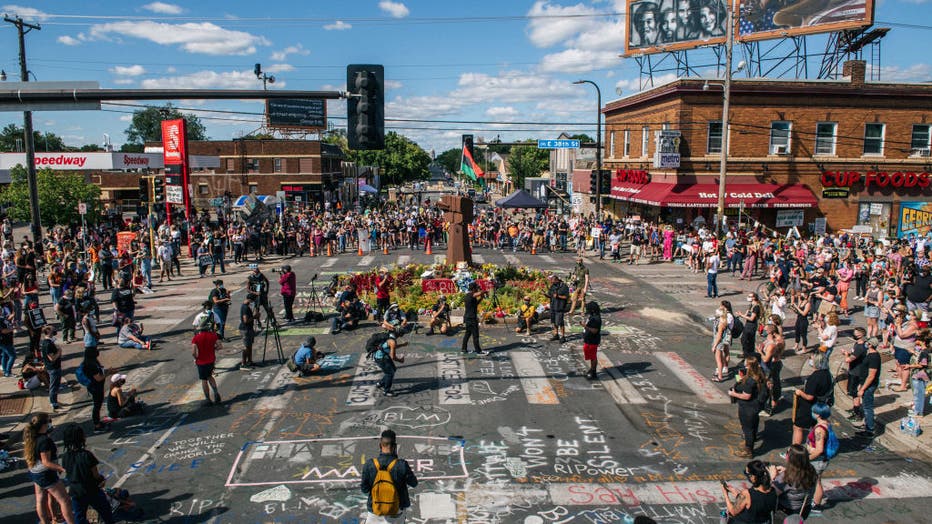Derek Chauvin trial: Seated jurors back up to 9 after Wednesday
MINNEAPOLIS (FOX 9) - Two new jurors were seated in the trial of Derek Chauvin, the former Minneapolis police officer charged in the death of George Floyd, Wednesday, bringing the total number of jurors seated in the trial back up to nine. Prosecutors and defense attorneys will continue to question potential jurors until they can seat a 12-person jury, with two alternates.
The trial is being streamed live, gavel to gavel, at fox9.com/live.
Court proceedings began at 8:45 a.m. with Hennepin County Judge Peter Cahill calling back seven previously seated jurors to the courtroom via Zoom to question them about the Floyd family’s $27 million civil settlement, which was announced last Friday after the jurors had already been selected.
Judge Cahill asked the jurors whether they had seen or heard about the record settlement and if they had, whether it would impact their ability to be impartial in the case. The number of seated jurors shrank from nine to seven during this round of questioning after the judge dismissed two of the jurors who felt they could no longer be impartial after learning of the settlement.

Derek Chauvin in court on Wednesday, March 17.
Jury selection resumed at 9:30 a.m. Six potential jurors were questioned on Wednesday, with two new jurors seated--Juror No. 79 and No. 85. One of the six jurors was struck by the defense and three others were dismissed by Judge Cahill for cause.
Before adjourning for the day, Judge Cahill announced that due to pretrial publicity, he was granting the defense three additional peremptory strikes and the prosecution one. Court is in recess until 8:30 a.m. Thursday.
Judge dismisses 2 seated jurors
Two previously seated jurors were dismissed on Wednesday over their knowledge of the record $27 million civil settlement for the Floyd family.
Judge Cahill called the first seven jurors seated in the trial back to the courtroom via Zoom to question them over whether they had heard or read about the civil settlement. The city's announcement came on Friday after they had been selected to sit on the jury. If they had heard the news, Cahill asked whether they could still remain impartial in deciding the case.
Juror No. 36, a Hispanic man in his 20s, was dismissed for cause after he told the judge he had heard about the lawsuit and said it would impact his ability to be impartial "a lot." He said it confirmed his negative opinion of Chauvin.
Juror No. 20, a white man in his 30s, told the judge he saw the headline about the settlement and that the dollar amount was "shocking" to him. He said he assumed the city was admitting something went wrong.
The seven jurors were re-questioned after Judge Cahill granted a motion by Chauvin’s defense attorney, Eric Nelson, to call them back over concerns the news of the record civil settlement would affect his client’s ability to get a fair and impartial trial.
Where jury selection currently stands

This is where the jury for the Derek Chauvin trial stands after seven days of jury selection.
- Nine jurors seated--five men, four women. A total of 14 jurors (12 jurors and two alternates) are needed to start trial.
- Defense has used twelve of their 18 peremptory challenges.
- Prosecutors have used five of their 10 peremptory challenges.
Judge Cahill told the selected jurors to go home and not to do any reading or research about the case in the coming weeks. He told them to report back to the courthouse on March 29 at 9 a.m., saying he is confident the trial will begin at that time.
Each prospective juror was assigned a randomized number when they filled out the 14-page questionnaire, which asked them about their knowledge of the case, police connections and attitudes towards the justice system as well as their media habits. Both sides agreed to dismiss 16 of the first 50 prospective jurors for cause on Monday based on their answers to the questionnaire.
GO DEEP: How the Chauvin trial jury will be selected
Jurors selected so far
- Juror No. 2: White man in his 20s
- Juror No. 9: Mixed/multiracial woman in her 20s
- Juror No. 19: White man in his 30s
- Juror No. 27: Black man in his 30s
- Juror No. 44: White woman in her 50s
- Juror No. 52: Black man in his 30s
- Juror No. 55: White woman in her 50s
- Juror No. 79: Black man in his 40s
- Juror No. 85: White woman in her 40s
READ MORE: Who are the selected jurors?
Derek Chauvin charges
Chauvin is charged with third-degree murder, second-degree murder and second-degree manslaughter in Floyd’s death last May.
Judge Cahill reinstated the third-degree murder charge against Chauvin during the first week of the trial.
Chauvin trial streaming and TV information
The Chauvin trial will be live streamed, gavel to gavel, at fox9.com/live and the FOX 9 News App. You can also find the FOX 9 stream on Tubi through connected TVs. Portions of the trial are likely to be carried live by several broadcast networks as well as Court TV.
Court schedule
The Derek Chauvin trial is being held in Courtroom 1856 of the Hennepin County Government Center in Minneapolis. During jury selection, until all the preliminary motions are heard by Judge Cahill, court will start at 8 a.m. most days with a hearing on preliminary motions, before moving on to jury selection at 9 a.m.
QUICK READ: Derek Chauvin trial essential info and FAQs
Jury selection process
To decide the jury, prosecutors and Chauvin’s defense attorneys will question each potential juror one at a time, separately from the others.
Each potential juror has already filled out a questionnaire asking about their knowledge of the case, police connections and attitudes towards the justice system as well as their media habits, which will be provided to the attorneys and the judge before jury selection.
Jury to remain anonymous
Potential jurors and jurors will only be referred to by a random, previously assigned number because Judge Cahill has ordered their identities to remain a secret for the duration of the trial. At the conclusion of the trial, Judge Cahill will decide when the jurors’ identities can be made public.
Jury sequestration
The jury will be partially sequestered during the trial and fully sequestered while they are deliberating, which means they cannot go home until they reach a verdict or the judge determines they are hung. However, the judge can order full sequestration of the jury at any time if the partial sequestration proves ineffective in keeping the jurors free from outside influence.
Opening statements in the trial are scheduled to begin on March 29. A verdict in the Chauvin trial is not expected until mid to late April.
Who is in the courtroom?
- Trial Judge Peter Cahill
- 1 judge's clerk
- 1 court reporter
- Derek Chauvin, the defendant
- The jury. The empaneled jury will consist of 12 jurors and 2 alternates.
- Up to 4 lawyers or staff for the prosecution, led by Assistant Attorney General Matthew Frank.
- Defense attorney Eric Nelson and up to 2 staff from his law firm
- 1 witness at a time in the courtroom
- 1 George Floyd family member
- 1 Derek Chauvin family member
- 2 members of pooled media - 1 print and 1 broadcast or digital media
- 1 broadcast technician
Courtroom restrictions
Courtroom 1856 was renovated specifically for the Derek Chauvin trial to maximize capacity and maintain COVID-19 social distancing standards. The courtroom is located on the 18th floor of the Hennepin County Government Center.
Judge Cahill has ordered certain behavior in the courtroom:
Jurors, attorneys, witnesses and support staff must wear masks and keep six feet from other people.
Masks can be removed when giving testimony, examining witnesses, giving opening statements or closing arguments. Attorneys must conduct all witness examinations and arguments from the lectern.
Any sidebar conferences will be conducted over wireless headsets. Chauvin will be outfitted with a headset to listen to these conferences, which will be off-the-record.
Jurors and potential jurors will be escorted to courtroom each day by deputies or security. No one can have contact with jurors except the judge, court personnel and deputies. Any attorney contact is limited to the jury selection process when court is in session.
Potential jurors will only be referred to by a randomized number.
Death of George Floyd
George Floyd, 46, died on May 25, 2020 while being detained by Minneapolis police officers Derek Chauvin, Tou Thao, J. Alexander Kueng and Thomas Lane at the intersection of 38th Street and Chicago Avenue. The intersection has remained closed to traffic since Floyd's death and has been dubbed George Floyd Square.

MINNEAPOLIS, MN - AUGUST 17: People participate in a demonstration on August 17, 2020 in Minneapolis, Minnesota. Community members came together for a rally to protest the city's potential forceful reopening 38th Street and Chicago Ave, an unofficial
A widely-shared video taken by a bystander showed Chauvin kneeling on Floyd’s neck for nearly nine minutes while he repeatedly cried, "I can’t breathe."
Minneapolis Police Chief Medaria Arradondo announced the firing of all four officers the following day. Chauvin was arrested and charged with Floyd’s death on May 29 and the three others were arrested and charged with aiding and abetting on June 3.
TIMELINE: George Floyd's death to Derek Chauvin's trial
The Hennepin County Medical Examiner's report ruled the death of George Floyd a homicide. The updated report stated that George Floyd experienced a cardiopulmonary arrest while being restrained by law enforcement.

